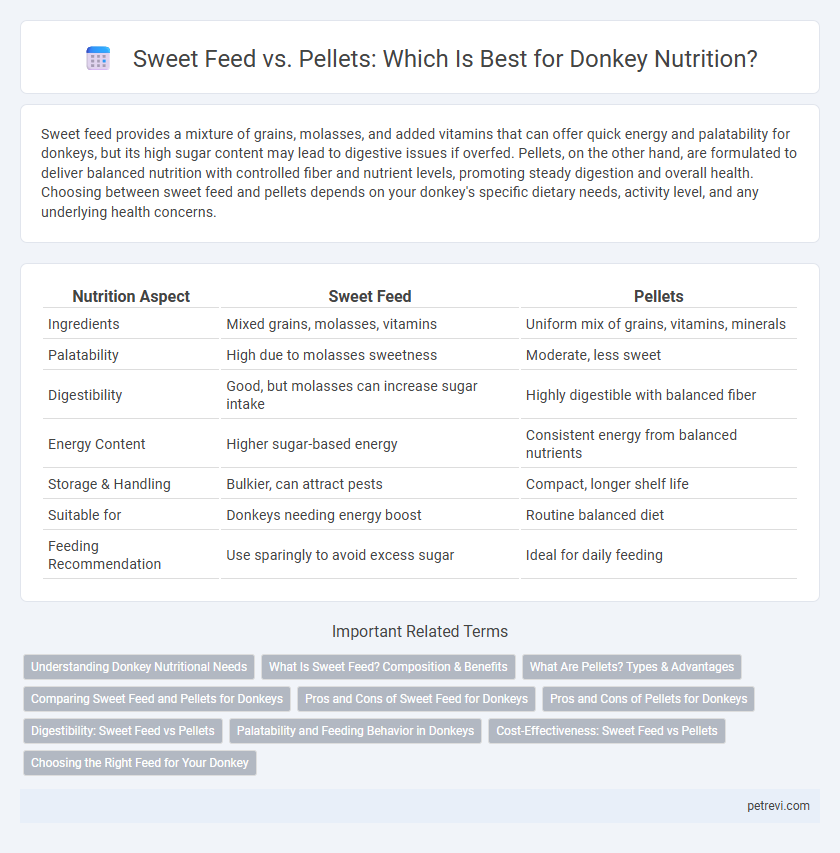Sweet feed provides a mixture of grains, molasses, and added vitamins that can offer quick energy and palatability for donkeys, but its high sugar content may lead to digestive issues if overfed. Pellets, on the other hand, are formulated to deliver balanced nutrition with controlled fiber and nutrient levels, promoting steady digestion and overall health. Choosing between sweet feed and pellets depends on your donkey's specific dietary needs, activity level, and any underlying health concerns.
Table of Comparison
| Nutrition Aspect | Sweet Feed | Pellets |
|---|---|---|
| Ingredients | Mixed grains, molasses, vitamins | Uniform mix of grains, vitamins, minerals |
| Palatability | High due to molasses sweetness | Moderate, less sweet |
| Digestibility | Good, but molasses can increase sugar intake | Highly digestible with balanced fiber |
| Energy Content | Higher sugar-based energy | Consistent energy from balanced nutrients |
| Storage & Handling | Bulkier, can attract pests | Compact, longer shelf life |
| Suitable for | Donkeys needing energy boost | Routine balanced diet |
| Feeding Recommendation | Use sparingly to avoid excess sugar | Ideal for daily feeding |
Understanding Donkey Nutritional Needs
Sweet feed often contains grains and molasses, providing higher energy but risking excessive sugar intake unsuitable for donkeys prone to laminitis. Pellets are formulated to offer balanced nutrients with controlled fiber, vitamins, and minerals tailored to donkeys' unique digestive systems. Understanding donkeys' need for low-starch, high-fiber diets helps optimize feed choice, ensuring proper weight maintenance and metabolic health.
What Is Sweet Feed? Composition & Benefits
Sweet feed for donkeys is a blend of whole or cracked grains, molasses, and added vitamins and minerals, designed to provide energy and enhance palatability. The molasses content improves taste and stimulates appetite, while the mix of corn, oats, barley, and beet pulp delivers essential carbohydrates, fiber, and nutrients. This combination supports digestive health, promotes weight gain, and offers a balanced source of energy compared to standard pellets.
What Are Pellets? Types & Advantages
Pellets for donkey nutrition are compact, processed feed made from grains, forage, vitamins, and minerals designed to provide balanced nutrients. Common types include alfalfa pellets, oat pellets, and mixed-grain pellets, each tailored to meet specific dietary needs and improve digestibility. Advantages of pellets include consistent nutrient content, reduced waste, easier storage, and enhanced palatability, promoting better overall health and digestion in donkeys.
Comparing Sweet Feed and Pellets for Donkeys
Sweet feed for donkeys typically contains a mix of grains, molasses, and added vitamins, providing a palatable energy source but potentially higher sugar content that requires careful management. Pellets offer a more balanced, uniform nutrient profile with controlled fiber and protein levels, promoting digestive health and reducing the risk of obesity and laminitis in donkeys. Choosing between sweet feed and pellets depends on the donkey's specific dietary needs, activity level, and health conditions to ensure optimal nutrition and weight maintenance.
Pros and Cons of Sweet Feed for Donkeys
Sweet feed for donkeys offers the advantage of palatability due to its mix of grains, molasses, and sometimes vitamins, encouraging consistent intake. However, its high sugar and starch content can lead to digestive issues like colic or laminitis in donkeys with sensitive metabolisms. Compared to pellets, sweet feed requires careful portion control and regular monitoring to prevent obesity and maintain optimal digestive health in donkeys.
Pros and Cons of Pellets for Donkeys
Pellets provide a balanced and convenient source of nutrition for donkeys, containing essential vitamins and minerals tailored to their dietary needs, which supports overall health and energy levels. However, pellets can be less fibrous than traditional sweet feed, potentially leading to digestive issues if not supplemented with adequate roughage. Additionally, pellets tend to be more expensive and require careful portion control to prevent overfeeding and obesity in donkeys.
Digestibility: Sweet Feed vs Pellets
Sweet feed consists of a mixture of grains, molasses, and fiber, offering palatability but sometimes compromising digestibility due to its higher sugar content. Pellets provide a more uniform composition with processed fibers that enhance digestibility and nutrient absorption in donkeys. Studies indicate pellets often result in more efficient digestion and reduced risk of digestive upset compared to sweet feed.
Palatability and Feeding Behavior in Donkeys
Sweet feed offers enhanced palatability due to its mix of molasses, grains, and sometimes additional flavorings, encouraging more eager consumption by donkeys compared to pellets. Pellets provide a consistent nutrient profile and reduce selective feeding but may be less favored by donkeys accustomed to the sweeter taste and texture of sweet feed. Understanding these differences in palatability and feeding behavior is crucial for optimizing donkey nutrition and ensuring balanced intake.
Cost-Effectiveness: Sweet Feed vs Pellets
Sweet feed typically offers a lower upfront cost per batch compared to pellets, making it a budget-friendly option for donkey nutrition. However, pellets provide a more consistent nutrient profile and reduced wastage, potentially lowering long-term feeding expenses. Evaluating total cost-effectiveness involves balancing initial price, feed conversion efficiency, and the specific dietary needs of the donkey.
Choosing the Right Feed for Your Donkey
Sweet feed and pellets both offer distinct nutritional benefits for donkeys, with sweet feed often containing added molasses providing extra energy and pellets delivering a balanced and consistent nutrient profile. Choosing the right feed depends on your donkey's specific dietary needs, activity level, and digestive health, as pellets tend to be more digestible and less likely to cause digestive upset. Regular consultation with an equine nutritionist ensures optimal feed selection that supports your donkey's overall health and weight management.
Sweet feed vs Pellets for Donkey Nutrition Infographic

 petrevi.com
petrevi.com